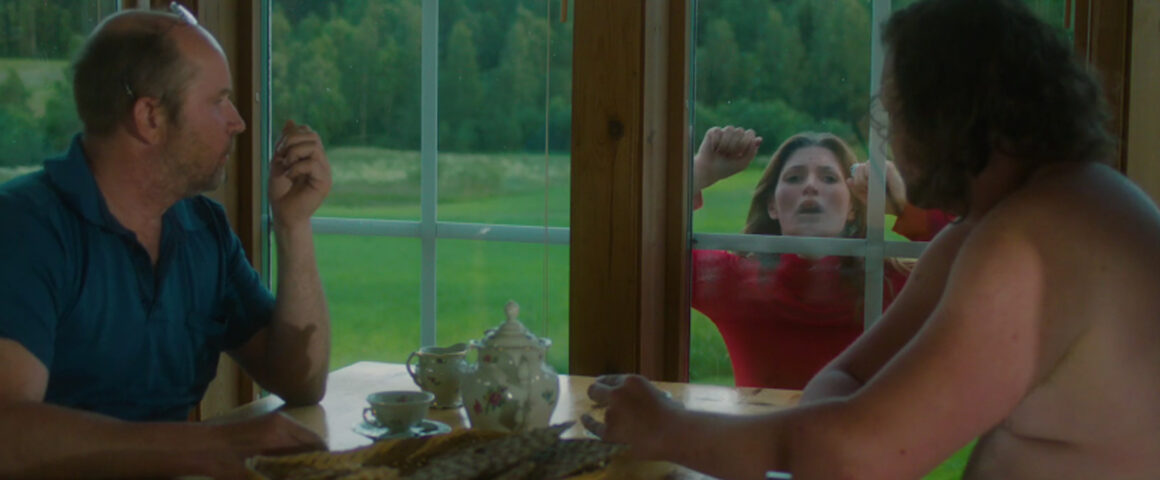Hot on the wicker heels of Ari Aster’s “Midsommar” is Blood Paradise, another chiller about uninitiated Americans travelling to a Swedish rural retreat. This time the victim is horror author Robin Richards (Andréa Winter, also co-writing with co-star and director Patrick von Barkenberg), whose last novel, “Return to Blood Paradise,” was a critical and commercial failure. Bored of her privileged existence — the poor dear is uninspired in all respects — her publisher sends her to the distant farm to rekindle her creative spark.
I wish that the filmmakers had found theirs. Organizing a bad movie into subtitled chapters like “The Writer” and “The Son” doesn’t make it any less bad.
Robin is picked up from the airport by Hans (Christer Cavallius), her biggest fan and a potential stalker. He brings her to the ranch of Farmer Rolf (Rolf Brunnström), a character who quickly out-creeps Hans, and whose mute sister-in-law makes dolls in the barn next door. There’s a room full of potential murder weapons and the grave of Rolf’s wife in the garden. Worst of all, the bathroom is outside!
Thus begins a procession of typical horror victim choices, starting with the decision not to turn straight around and return to the airport. Robin is laughably unprepared for country life, insisting at all times on heels and designer clothes. She’s horrified when she witnesses Rolf executing a chicken for food. You’d think a successful writer would have a modicum of empathy for the lives of others; an imagination worldly enough to conceive of authentic rural life. Apparently not.
Robin is a vacuous bore. Winter is radiant, but her character is a blank slate, aside from her conspicuous lack of compassion or curiosity in others. In the language of film, we are given precious little reason to care about her fate. It’s not even like she is essentially decent underneath — the self-pity, coldness and snobbishness are the sum parts of her character, through and through.
Aside from a couple of self-loathing scrawls, we get little insight into Robin’s presumably tormented mind. Indeed, her mind is not the film’s chief concern, but her body. The preoccupation with Winter’s naked form is partly baked into the plot — it is nominally a film about voyeurism — but Winter and von Barkenberg have nothing to say on the topic. We the audience are voyeurs without a reason to question our gaze.
This lack of personal intrigue would matter less if the situation with Rolf and his nutty relatives were better illuminated. Alas, they’re simply another backwoods family with ill intentions. Even the Leatherface clan had more of a basis for their malevolent insanity — at least they could point to a dreadful cascade of generational influence. We’re led to a finale which is spoiler-proof in its predictability, involving the doubly-dated clichés of cross-dressing and split personality. Just because your credit sequence uses an italicized font from the mid-90s doesn’t excuse tired tropes.
If we are to draw positives, Blood Paradise is certainly nicely shot and beautifully lit, capturing the crisp haze of the Scandinavian summer. It’s idyllic in its location, even if there is no atmosphere of which to speak. A faint vein of irreverent humor runs throughout, which is admittedly preferable to excessive self-seriousness, but it also points to a desperately uneven script.
I would concede that Cavallius delivers a fun performance, channeling some of the nervous energy of Scoot McNairy. Every time he’s on screen it is refreshing to see some semblance of the charisma lacking elsewhere. Indeed, by the end I felt I knew Hans and his wife better than the ostensible protagonist of the story — and that’s taking into account the fact that my screener copy was lacking subtitles for their Swedish exchanges.
Overall, Blood Paradise fails to satisfy on multiple levels. As a backwoods horror its setpieces are poorly staged and edited, frequently failing to establish the basic local geography necessary to incite tension. Even if it weren’t for the film’s strangely coy attitude to gore, the kills would land without visceral impact. There’s a risible climactic shock moment which dares to echo Stuart Gordon’s “Dolls,” but it serves only as a reminder of how horror comedy should be done.
As a work of torture porn it is tame and purposeless. As a black comedy its basic conceit is too nonsensical, and Robin’s endeavor too pointless, to allow for any despairing humor. And as a meta-thriller it’s a non-starter: That Robin is an author is neither here nor there — it’s just another trope to tick off the list. Holistically unsatisfying.



